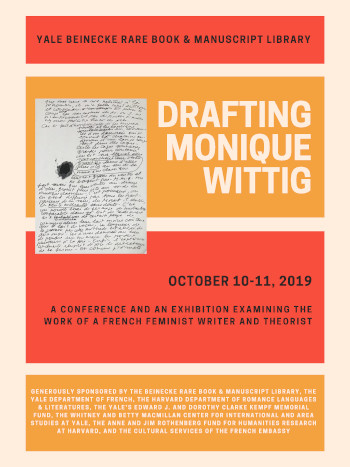Drafting Monique Wittig
Conference organized by Morgane Cadieu (Yale) and Annabel Kim (Harvard)
This conference, to be held at the Beinecke Rare Book & Manuscript Library, both marks the 50th anniversary of the publication of Wittig’s landmark novel, Les Guérillères, and showcases the Beinecke’s recent acquisition of the Wittig papers. Participants will have the opportunity to think Wittig alongside and in the archives that constitute a material trace and record of her life and thought. Wittig’s archives, which will be featured in an exhibition at the Beinecke, will enable us to explore her relation to unfinished, encyclopedic, and collective forms of writing, as seen in her and Sande Zeig’s 1974 publication, Brouillon pour un dictionnaire des amantes. And unpublished documents (such as Wittig’s lecture notes for the classes she taught at various American universities) will reveal the influence her work as a teacher and her work as a writer had on each other. While Wittig’s archives will occupy a central role in the conference, no previous knowledge or familiarity with them is required to be able to participate, and we aim to bring together French- and English-speaking scholars from across the disciplinary and geographical map to reflect on the afterlives Wittig’s work and thought has had in the intervening years in literature, theory, the social sciences, and the arts.
“Drafting Monique Wittig” (in all of draft’s polysemy), follows up on and responds to the 2004 conference held at Harvard (co-sponsored by Yale University), “Remembering Monique Wittig: A Memorial Conference,” which brought together a diverse set of interdisciplinary scholars to reflect on the life and work of Wittig and to mark her passing in 2003.The theoretical, intellectual, and political landscape of our current moment is markedly different now than it was then. To name just a few developments, Wittig’s ars poetica, Le Chantier littéraire was published in 2010, providing the most-revised and latest iteration of Wittig’s reflections on the aesthetic and political dimensions of writing; intersectionality has emerged as the dominant paradigm within feminist studies and activism; trans studies is now a robust field of its own distinct from both feminist and queer theory; and new materialisms and post-humanisms have pushed aside the linguistic and representational questions that were so crucial to Wittig’s thought and work and to her universalist recuperation of human subjectivity for all minoritized and marginalized subjects. How does Wittig continue to stimulate and inform new approaches as diverse as affect theory and critical study of the Anthropocene? What is Wittig’s legacy–literary, experimental, conceptual, and philosophical—on contemporary literature?
This conference will explore the question of what Wittig can do for us and what we can do with Wittig in this shifting landscape, insisting thus on how her œuvre isn’t a museum but a worksite and an arena.
Learn more at:

